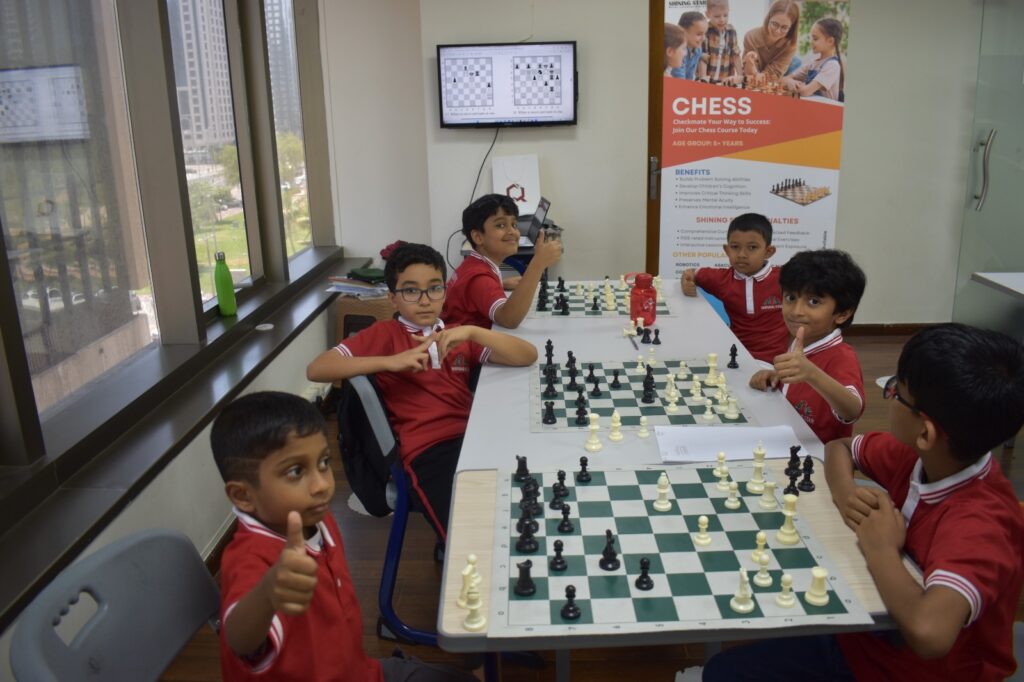Chess for kids is more than just a game—it’s a powerhouse of cognitive benefits. This timeless strategy game helps to boost brain development in young learners, providing them with essential skills that will serve them well throughout their academic and personal lives. Whether your child is a beginner or a seasoned player, the act of playing chess fosters a range of mental capabilities. In this blog, we’ll explore five key reasons why chess for kids is crucial for their cognitive development.
1. Chess for Kids Enhances Problem-Solving and Critical Thinking Skills
Chess requires children to think critically and strategically, constantly evaluating different moves and anticipating their opponent’s actions. This process of considering multiple possibilities and outcomes enhances their problem-solving abilities. Kids learn to break down complex challenges into manageable steps, a skill that translates into both school and real-world situations.
Every chess move comes with its own set of consequences, and by navigating these decisions, children develop a logical and analytical mindset. As they learn to plan their moves ahead, they are also learning to consider the best course of action in other areas of life. This promotes a deeper understanding of cause and effect, laying a solid foundation for critical thinking.

2. How Chess for Kids Improves Memory and Concentration
One of the standout benefits of chess is its ability to improve memory. As children play, they need to memorize the positions of various pieces and recall past moves. The need to remember patterns, strategies, and game positions strengthens short- and long-term memory. This not only helps kids excel in chess but also enhances their academic performance, as memory plays a key role in learning.
Additionally, chess helps improve a child’s concentration. To succeed in the game, children must focus on the present moment, paying attention to their opponent’s moves and formulating their next steps. This level of concentration is beneficial across different subjects, as it encourages children to stay attentive during lessons, complete tasks more efficiently, and absorb information more effectively.
3. Boosting Cognitive Function with Chess for Kids
Studies have shown that playing chess has a positive impact on overall cognitive development. Chess stimulates both the left and right sides of the brain, improving analytical and creative thinking. The logical nature of chess activates areas of the brain associated with problem-solving, while the creative aspect encourages imaginative thinking and pattern recognition.
Research has also found that kids who play chess tend to score higher on IQ tests, with improvements in areas like spatial reasoning, math, and language skills. By engaging in the mental workout that chess provides, children develop a more flexible and adaptive brain. This, in turn, helps them excel in various academic pursuits and complex problem-solving tasks.
4. Chess for Kids Teaches Planning, Patience, and Strategy
Chess isn’t a game of impulse; it requires thoughtful planning and patience. Every successful player knows that winning a chess game is about strategy, not just making quick moves. Kids learn how to plan ahead, consider their options, and create long-term strategies. They quickly realize that their first move isn’t always the most important—what matters is having a vision for the game.
In addition to planning, chess teaches children the importance of patience. They must resist the urge to rush their decisions and instead think carefully about each move. This cultivates a disciplined mindset that can be applied to many aspects of life. Children who play chess regularly are also less likely to be impulsive and more likely to approach challenges with a calm, considered attitude.
5. Promoting Emotional Intelligence Through Chess for Kids
Chess is not just about intellectual growth; it also helps children develop important emotional skills. Through the game, children learn to handle both winning and losing, gaining emotional resilience in the process. Losing a game teaches them how to deal with disappointment and how to keep trying, while winning instills a sense of achievement and humility.
Sportsmanship is another crucial lesson that chess imparts. Children learn how to respect their opponents, whether they win or lose, fostering qualities like fairness and kindness. These emotional skills are not only beneficial on the chessboard but also in social situations, school environments, and future career paths.
Conclusion: Unlock Your Child’s Full Potential with Chess for Kids
Chess for kids is far more than just a recreational activity—it’s a powerful educational tool that helps children develop essential life skills. From improving cognitive functions to fostering emotional resilience, chess offers a unique and enjoyable way for children to learn and grow. At Smartyca, we believe in nurturing the whole child, and chess is a fantastic way to support their intellectual and emotional development.
By incorporating chess into your child’s learning routine, you’re providing them with a fun and engaging way to enhance their cognitive abilities. Watch as they unlock new levels of brainpower, develop sharper focus, and gain valuable life skills that will serve them well in their future endeavors.
Ready to start your child’s chess journey? Get started today and let them experience the cognitive benefits of chess for themselves!
